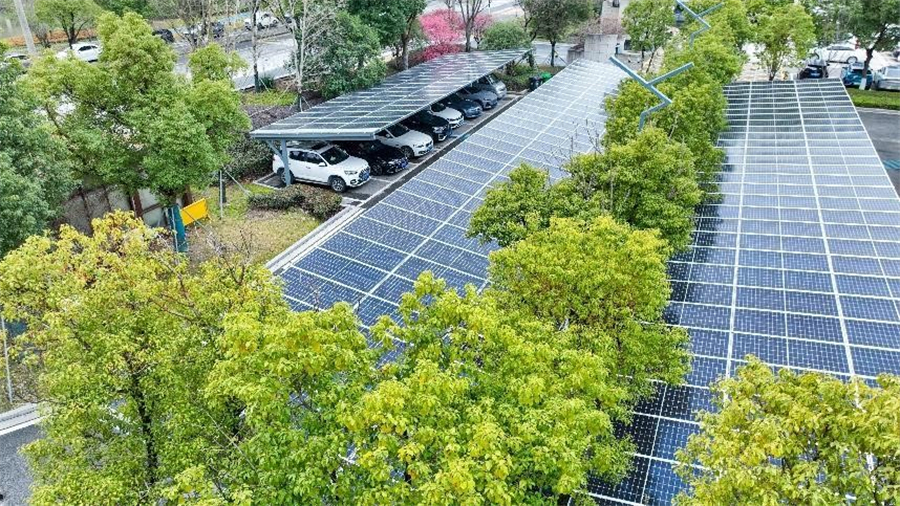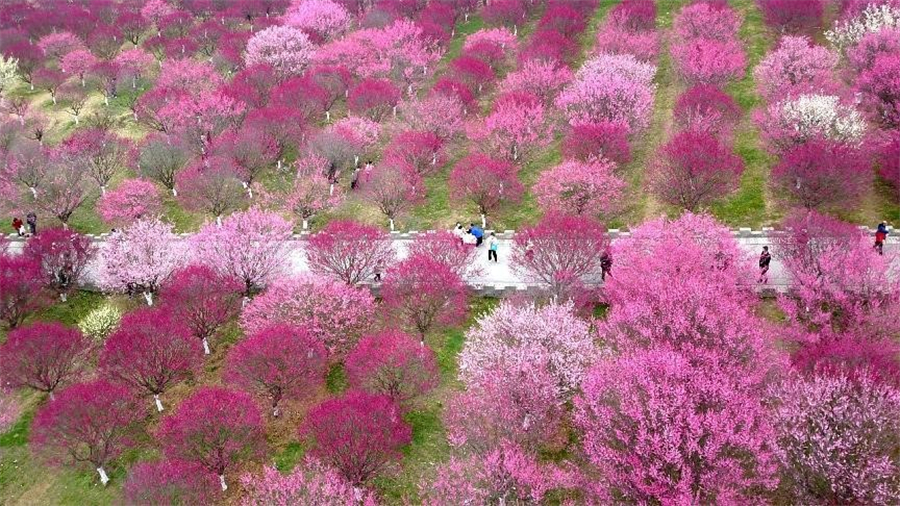Chinese modernization responsible for China, benefits the world
Upholding the concept that lucid waters and lush mountains are invaluable assets, China is promoting its comprehensive green economic and social transformation in pursuing high-quality development.
Green is becoming a defining feature in the country. China has launched the world's largest carbon trading market, and ranks first globally in terms of the development and utilization scale of renewable energy as well as new energy vehicle output and sales.
Wild populations of over 300 rare and endangered flora and fauna species have been restored and increased thanks to China's efforts and nature reserves have covered 18 percent of the country's total land area. A magnificent picture of human-Nature harmony is unfolding.
Respecting Nature, following Nature's laws, protecting Nature and promoting harmonious coexistence between man and Nature are distinctive features of Chinese modernization.
Chinese modernization is committed to sustainable development and to the principles of prioritizing resource conservation and environmental protection and letting Nature restore itself. It will continue to pursue a model of sound development featuring improved production, higher living standards, and healthy ecosystems to ensure the sustainable development of the Chinese nation.

Photo taken on Feb. 24, 2023 shows a parking lot covered by solar photovoltaic (PV) panels in Nanxun district, Huzhou, east China's Zhejiang province. The panels not only offer shelter for vehicles, but also power the lot by converting light energy into electricity. [People's Daily Online/Lu Xiaoyao]
Chinese modernization proves that eco-environmental protection and economic development are interdependent and mutually reinforcing. Building an eco-civilization and promoting green, low-carbon and circular development can meet people's growing demand for a beautiful environment, and achieve higher-quality, more efficient, fairer, more sustainable and safer development.
How to achieve human-Nature harmony is a question that must be answered by every country in the pursuit of modernization.
In the past two centuries of human modernization, most developed countries in the West have followed a path of "treatment after pollution" which creates huge material wealth at a cost of intensified exploitation of natural resources. It has brought severe ecological and environmental problems and laid bare the growing tensions in the human-Nature relationship.
The pursuit of economic growth at the sacrifice of the environment and over-exploitation of resources no longer fits the current stage of global development, said Patricio Giusto, director of the Sino-Argentine Observatory. The international community should follow a path of modernization that relieves the burden on Nature and is responsible for future generations, he said.
As a developing country with more than 1.4 billion people, China doesn't follow the old path of Western developed countries. It pursues human-Nature harmony when striving for modernization, which is responsible for both itself and the rest of the world.
China develops its eco-environmental protection from a broad and long-term perspective.
Since the 18th National Congress of the Communist Party of China, the country has been holding the belief that building an ecological civilization is of fundamental importance for the sustainable development of the Chinese nation, launching a host of creative, forward-looking, and fundamentally important initiatives and taken major steps toward building a beautiful China. As a result, China's ecological and environmental protection efforts have seen sweeping, historic, and transformative changes.
Thanks to the ceaseless efforts, the ecological foundation for Chinese civilization has become more solid, and the awareness of green development more deeply-rooted. The sound ecology and environment are giving the Chinese people a higher sense of fulfillment, happiness and security.
Erik Solheim, former executive director of the UN Environment Programme, noted that the concept of ecological civilization is not just something for China, but a model that can influence and inspire the rest of the world. He believes China's successful practices in building an ecological civilization have offered valuable experiences for the international community.

Tourists enjoy flowers at a botanical garden in Maojian district, Shiyan, central China's Hubei province, Feb. 25, 2023. [People's Daily Online/Cao Zhonghong]
Chinese modernization reflects the country's philosophy of helping others while pursuing one's own success.
Over the past decade, China has been among the countries with the fastest energy intensity reduction in the world. It has overfulfilled the 2020 target of cutting carbon emission intensity by 40 to 45 percent. As a result, a total of 5.8 billion tons less of CO2 is emitted, which is another example of Chinese development benefiting the world.
China now has the world's largest carbon market and biggest clean coal-fired power generating system, and is working actively and prudently toward the goals of reaching peak carbon emissions and carbon neutrality.
The country is vigorously building a green Silk Road in the implementation of green development, environmental protection and climate cooperation.
Besides, it took the lead by investing 1.5 billion yuan (about $217.21 million) in establishing the Kunming Biodiversity Fund, so as to support biodiversity conservation in developing countries.
"China places ecological progress in the core of its development strategy, and this vision has made the country a leader in global ecological governance," said Jose Luis De La Cruz, director of the Institute for Industrial Development and Economic Growth of Mexico.
If we humanity do not fail Nature, Nature will not fail us. China will unswervingly follow the path of modernization of harmony between humanity and Nature, build itself into a beautiful country where man and Nature live in harmony, and contribute more to building a community of life for man and Nature.
























